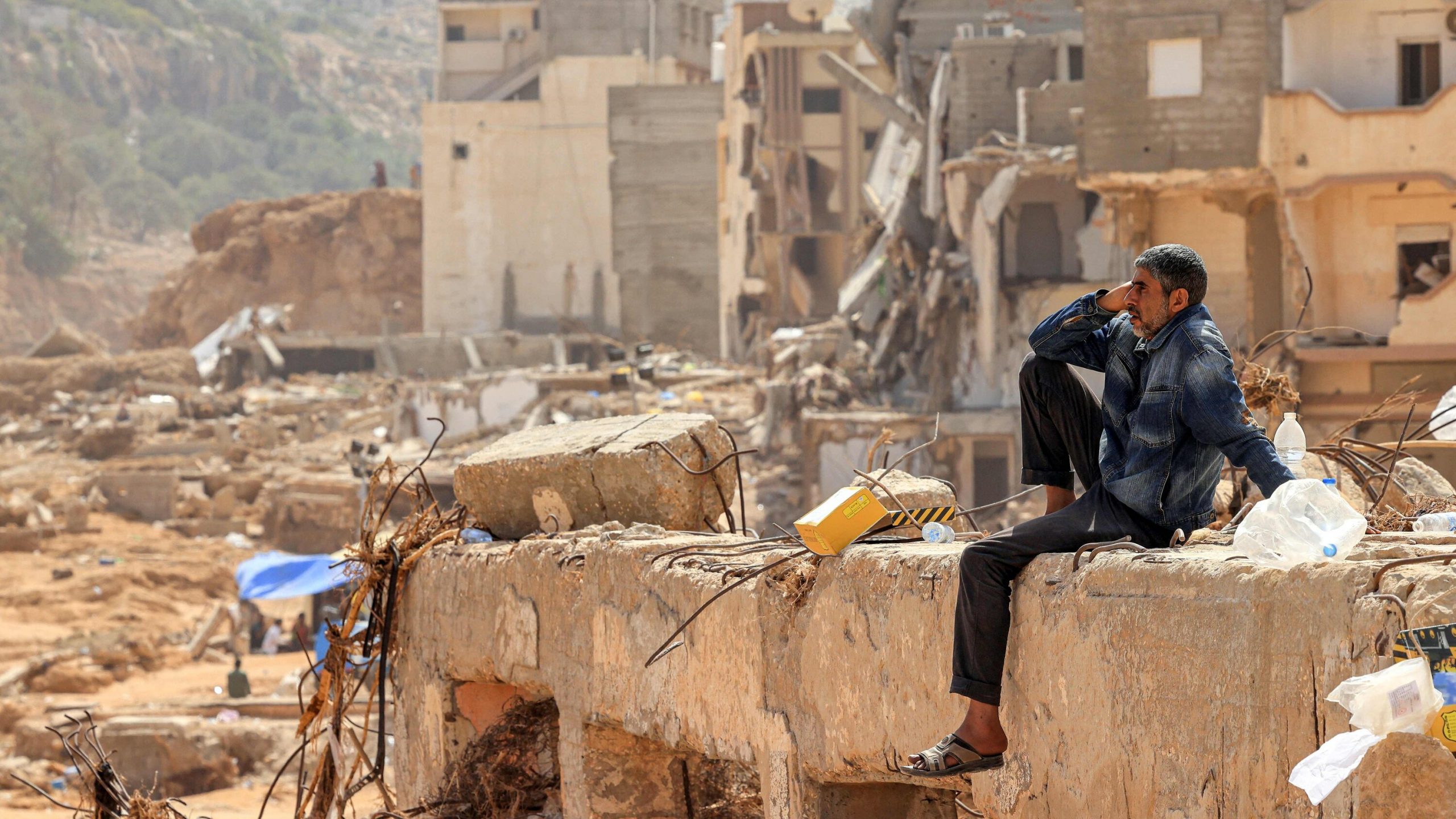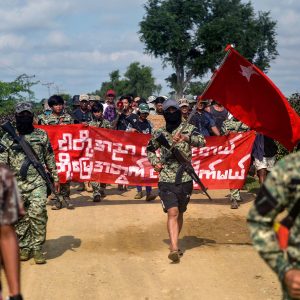Derna was a beautiful seaside town, built on the ruins of a Greek colony by Spanish Muslims in the late 15th century. It was home to Libya’s first movie theater, dozens of religious buildings, cafes, and bookstores. It was a town rich with culture and intellectual vitality. But the physical evidence of that is now gone.
Storm Daniel hit Derna on September 10, 2023. Torrential rainfall collapsed two major dams, flooding the city with over 30 million cubic meters of water. Most buildings were completely destroyed, and at the time of writing, death tolls have risen to 11,300, with thousands missing and tens of thousands more displaced.
Like many recent natural disasters, Libya’s floods were exacerbated by climate change. More distinctively, however, they were exacerbated by Libya’s political instability.
History of Instability
After seizing power from the constitutional monarchy in a military coup in 1969, political revolutionary Muammar Gaddafi ruled Libya as an autocracy until 2011, when he was ousted and assassinated in a NATO-backed uprising during the Arab Spring. Libya has been in chaos ever since, with limited statehood divided between two separate and competing governments. In the west, based in Tripoli, is the UN-recognized Government of National Unity (GNU); in the east, where Derna is located, is strongman General Haftar’s regime, supported by the Libyan National Army (LNA), Haftar’s de facto personal militia.
This fracturing of the Libyan government led to much of the political instability that intensified the disaster in Derna. According to the World Meteorology Organization (WMO), the number of flood casualties could have been significantly reduced if only Libya had a functional meteorological service able to issue disaster warnings. A functional service would have, according to WMO Secretary-General Petteri Taalas, issued forecast warnings that compelled authorities to evacuate citizens well ahead of the storm.The WMO has tried in the past to work with Libyan authorities to fix their meteorological service, but the danger and political instability in the region prevented that from happening.
Only part of this functional response took place. The GNU in Tripoli issued severe-storm warnings 72 hours before Storm Daniel arrived, but, being in the west, it had no control over tangible policies in Derna.
In Derna, authorities issued contradicting messages: the city’s website urged citizens to evacuate, yet residents received text messages to their phones urging them to stay in their homes. The effects of this confused government response is now felt throughout Derna and its surrounding areas. Schools have been turned into shelters, posting inhabitants lists outside their doors in hopes that families and friends can find each other. Many people have no way of contacting their loved ones after phones were swept away by the floods. Hundreds of unidentified bodies were buried in mass graves, and officials say it could take up to a year for them to be exhumed for identification.
Past conflict also increased risk of disaster. In 2018, General Haftar led a 9-month siege on Derna in the name of anti-terrorism. That siege ended up damaging much of Derna’s already-weak infrastructure, especially the now-collapsed dams, which, according to Derna’s deputy city mayor Ahmed Madroud, have not been repaired since 2002. Reports and warnings have been issued for years, as recently as 2022, about the frailty of Derna’s dams. Yet the political instability in Libya has prevented contractors from repairing them, and the political division has prevented the allocation of a development budget for the past three years, which would have included funds for infrastructure upkeep.
Corrupted Response
Libya’s governmental division and instability not only exposed Derna to greater damage; it also slowed disaster response. The division prevented immediate united government aid. While coordination was relatively quick considering the separate governments, immediate response is critical for humanitarian crises of this scale, and Libya’s lack of central government impeded that. Even the limited responses that did take place remain mired in controversy and concerns of corruption. General Haftar installed his son Saddam Haftar as the head of the disaster response committee, leaving humanitarian organizations working with a man whose forces, according to UN experts, had stolen “substantial quantities” of cash and silver from the central bank, and committed various war crimes.
To make matters worse, eastern, LNA-controlled Libya has been called an “informational blackhole” by Reporters Without Borders, a place where foreign journalists are denied access and local journalists are directly controlled and oppressed by Haftar. The lack of free press has long prevented criticism of Haftar’s administration. Now, the unfree press prevents both local and international communities from obtaining valuable information on and analysis of disaster response.
Libyans are seemingly fed up with this corruption and opacity. Some are even calling for an independent international investigation into this “manmade tragedy.” If this investigation takes place, it may be able to expose more shadowy aspects of Libya’s governments and promote more accountability.
Mending the Fractures
It is uncertain how the situation in Libya will develop considering Libya’s limited statehood, fractured government, and present corruption. The recent media blackout in response to civilian protests only raises more issues as an attack on civil society. One thing, however, is certain: Libya’s history of political instability exacerbated an already extensive natural disaster, and to prevent such a problem in the future, Libya’s governments must find a way to heal their fracture and restore political stability.
There is some hope for change to finally occur: in late July 2023, the Libyan House of Representatives gave preliminary approval for the formation of a unified interim government prior to holding general elections for national leaders. On October 2nd, the Libyan Parliament approved election laws for the use of the interim government, which had been under discussion since May. As the interim government project progresses and more consensus is reached, it appears to be a viable solution to Libya’s divided government.
One of the main issues with the interim government plan was the lack of backing from the United Nations, which had for years called for elections ahead of government reunification. In July, they had called the interim government a “unilateral initiative,” implying their lack of support. In August, however, the UN seemed to have changed its mind, now supporting the unification of government before elections. With new UN backing, the issue of Dabaiba, the interim prime minister of the GNU, refusing to step down now also appears diminished. UN support also opens up the possibility for UN-overseen elections, which would help ensure that the elections are free and fair, and provide them added legitimacy.
Concerns about this new approach remain. For one, although the UN envoy to Libya, Abdoulaye Bathily, says the interim government plan is being discussed with Dabaiba and Haftar, it is unclear if either leader is on board with this plan. This is particularly an issue with Haftar; his strong-armed, personal-militia-styled regime would be difficult to override if Haftar himself is not supportive. Additionally, the international community, including the UN, has been repeatedly accused of prioritizing “‘stability’ over accountability,” enabling the profiting of elites at the expense of average citizens. The UN’s new approach may just be a shift toward policy currently popular among Libyan elites, as a form of appeasement in pursuit of “stability,” rather than a shift in what experts actually believe to be the most promising course of action.
There is much work left to be done to reunify Libya’s government. The approved interim government must still be implemented, and the elections must still be held. But, steps have been taken, and hopefully, the tragedy in Derna will serve as a catalyst for steps to come.
Featured Image Source: Karim Sahib/Agence France-Presse – Getty Images






Comments are closed.